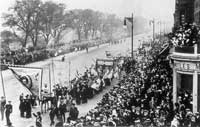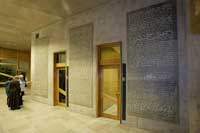The Suffragettes - Those that fought for equality
Priscilla Bright was from NW England. She had had a good Quaker education and ran a girls school for the mill girls with her sisters. They taught reading, writing and sewing.
She was active in progressive causes like the anti slavery movement where she met her husband Duncan McLaren. Priscilla was disowned by the Quakers for marrying out, so her life became solely based in Edinburgh.
 Priscilla was first president of Edinburgh Society for Women’s Suffrage in 1867 and her step daughter Agnes was joint secretary.
Priscilla was first president of Edinburgh Society for Women’s Suffrage in 1867 and her step daughter Agnes was joint secretary.
In 1882 Scottish Women were granted municipal franchise - she challenged the illogicality of women voting for councillors but not MPs.
Active all life - 2 days before death in 1906 she dictated a letter of sympathy and admiration ‘for their noble courage and self sacrifice’ to 9 women incarcerated in Holloway prison.
Sarah Elizabeth Siddons Mair was only 19 when she founded the Edinburgh Essay Society in 1865 which became the Edinburgh Debating Society in 1869. The importance of the Debating Society was that for the first time it enabled women to discuss public affairs without the fear of male scorn. The chance to express and contest ideas amongst other intelligent women gave them schooling in public speaking and confidence to embark on campaigning.
Out of the debating society came, amongst other things, the “Edinburgh Association for the University Education of Women” which persuaded others to set up university standard classes for women, which by their success, helped to ensure the eventual admission of women to a full university degree.
She was granted an honorary degree LLD from Edinburgh University in 1920 and a DBE in 1931. Successor to Priscilla Bright in Edinburgh national Society of Women’s suffrage and president of Hospital Society during war years (Elsie Inglis a member) Died 1941
Jessie Chrystal MacMillan was one of the first women to attend Edinburgh University in 1892. There she studied maths and philosophy. In 1906 she was secretary of Committee of Women graduates of Scottish Universities
 The committee were members of the General council of Edinburgh University. The 1867 Electoral Reform Act entitled Council’s 40 members to elect 2 members of Parliament, but the women were refused voting papers..
The committee were members of the General council of Edinburgh University. The 1867 Electoral Reform Act entitled Council’s 40 members to elect 2 members of Parliament, but the women were refused voting papers..
In the Council’s statutes the term person (as opposed to man) was used. The men claimed that person meant man. The women took it to court, the court of session and then the house of Lords in 1908. Chrystal argued the case herself. She was still defeated but she was popular in the press and country.
Throughout her life she championed causes that supported equal citizenship for women. She was called to the bar in 1923 - one of the first women to be so.
She sought equality in employment opportunities and campaigned to secure retention of British nationality for women married to foreign nationals. (This was not resolved until long after her death)
Link to explore people site. This also has entries for others - Elsie Inglis, Sophia Jex Blake and James Miranda Barry.
Travelling the Distance, was commissioned by the Scottish Executive and features 100 handwritten sentences in porcelain from women around Scotland, on their female role models.
